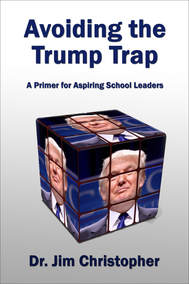
This past week however opened up a new and significant series of events that are also instructional for not only administrators but teachers and parents as well. The separation of refugee children from their parents created a communications, logistical and human catastrophe on multiple levels. Based on a newly proclaimed "zero tolerance" policy for dealing with refugees entering the country illegally, the administration proudly proclaimed that arresting parents and seizing their children would create a "deterrent" that would prevent future violations of the laws and policies surrounding immigration. The result of taking this step, as we now all know, resulted in a human rights crisis and a public relations nightmare. And, even in backing down (while typically blaming everyone else), Trump and his leadership team demonstrated a remarkable degree of both tone deafness, and incompetence. Doubling down this morning, the President tweeted that all illegal refugees should be immediately deported to their native country without any legal remedy and offered to reunite families at the airport if the parents agreed to be shipped home without having the chance to make their case for asylum. Due process by damned!
So what are the lessons here for schools?
1. To begin with, zero tolerance disciplinary policies are invariably losers. In institutions that pride themselves on valuing the worth of each individual student, and that are committed to personalizing learning, the idea that "one size fits all" with respect to discipline runs counter to the expressed ethos of any school. That doesn't mean that you shouldn't have clear expectations, and a range of possible consequences, but they have to be tailored to the individual and applied with care and with a clearly articulated rationale. Arbitrary punishments are most often seen as unfair and lead to an "us and them" attitude towards school climate rather than a collaborative "we".
2. The threat of punishment is a very weak deterrent. Most people in our society operate on the assumption that when they break the law they probably won't be caught and therefore the potential consequences of their actions are immaterial to them. I would hazard a guess that there isn't a car-driving adult reading this blog who doesn't speed on a regular basis, or roll through the occasional stop sign, or check messages when stopped at a light. The fines are often quite hefty for these actions but our normal response is that we are "unlucky" when we get caught rather than seeing ourselves as guilty of an offence. Kids are the same way. They are not being defiant, or reckless, or sneaky when they break the rules. They are just being kids. Getting caught gives us a chance to act as educators with respect to acceptable behaviour - not as judge, jury and executioner.
3. Due process is important! We are rightly outraged when people are incarcerated or deported without the benefit of a fair hearing and representation, but we violate the rights of our students that way every day. We isolate students from their supports, extract confessions, pressure them to testify against their peers, threaten to contact parents, and then mete out consequences in a kind of Principal's Court of Star Chamber. Like Donald Trump, we often convince ourselves that the ends (compliance, contrition, confession) justify the means. As the U.S. administration has found this week, fast tracking the process is fraught with peril and often results in unintended consequences for the school. In our case we have found that providing a student advocate (counsellor, trusted teacher, parent etc.), while making the process a little more convoluted and messy, usually results in a deeper student understanding of the issue at hand and results in a reduction in repeat offences.
4. Most parents, teachers and kids want a calm, positive and productive learning environment for everyone. Tom Bennett (@tombennett71), the leader of the researchEd movement worldwide, notes that "Low level disruption sounds cute, but it’s kryptonite for any lesson. It normalizes rudeness, laziness, and grinds teachers down over weeks and months. It is no small issue. It is the most common reason for classroom behaviour to disintegrate." He is right! And the best way to counter low level disruption is by setting and enforcing clear guidelines, expectations, and classroom norms. Buy-in comes from consistency, and peer community acceptance, and not from Draconian enforcement measures. Unfortunately, driven by the debasing of discourse through social media, we have become a society of "low level disruptors" which is why the extremism of the past week, while repugnant, was not particularly shocking to anyone. Schools are the key place to reverse that trend by reinforcing civility and social norms and expectations and not by turning a blind eye and a deaf ear towards breaches of classroom community norms.
There are a lot of strident voices in the United States right now falling on either side of the refugee debate. Illegal immigrants are either seen as innocent victims of the system or potential gang members trying to jump the line in order to get easy access. Currently there is little middle ground consensus on how to effectively address what is clearly a problem without trampling on people on the way.
Schools are like that too. An administrator friend told me recently that they had developed a "zero tolerance" policy for skipping school. If a student accumulated so many undocumented absences that they were affecting her or his academics, they were to be suspended for a week. When I gently pointed out the absurdity of exclusion as a consequence (reward?) for skipping, she looked at me blankly and said "There have to be consequences for skipping beyond simply failing the course!"
I guess we still all have a long way to go!
If you are interested in reading my ebook "Avoiding the Trump Trap: A Primer for Aspiring School Leaders" you can get it free on iBooks or by clicking this link: https://www.smashwords.com/books/view/797724


 RSS Feed
RSS Feed
